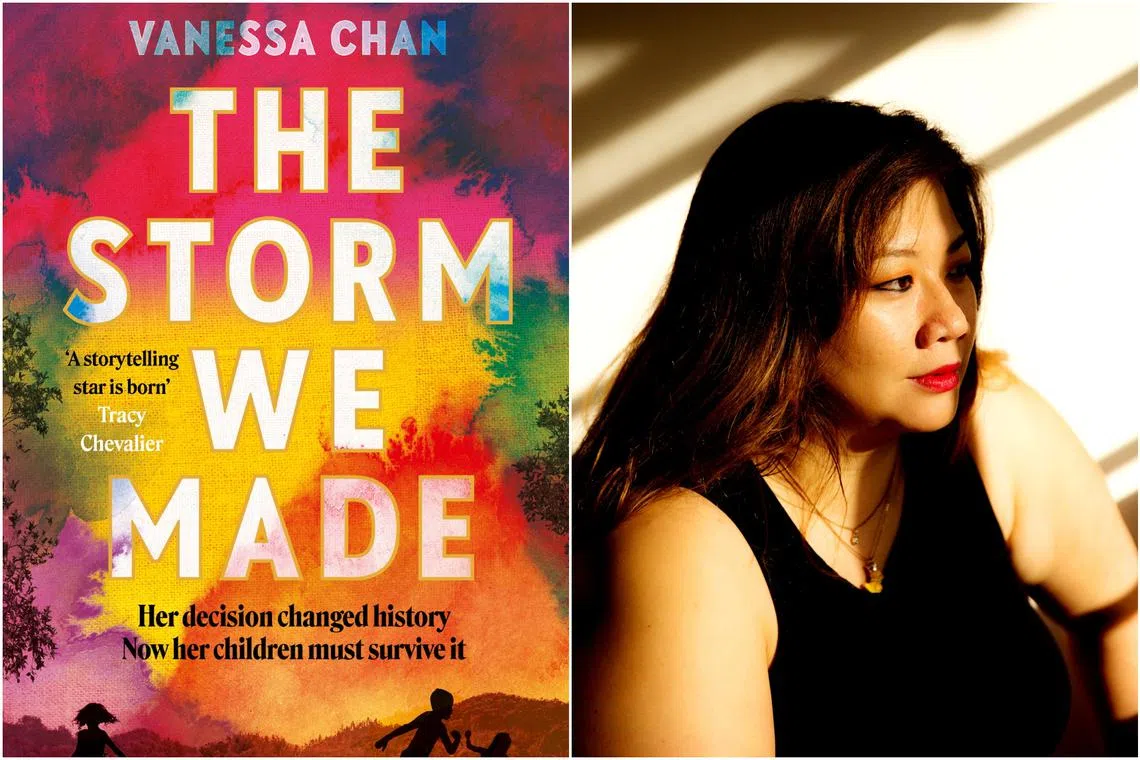Book review: Vanessa Chan’s The Storm We Made an uneven Malayan espionage thriller
Sign up now: Get ST's newsletters delivered to your inbox

Malaysia-born author Vanessa Chan's The Storm We Made is an espionage thriller set in Malaya in the 1930 and 1940s.
PHOTOS: HODDER & STOUGHTON
The Storm We Made
By Vanessa Chan amzn.to/3U8KQv0
Historical fiction/Hodder & Stoughton/Paperback/337 pages/$31.32/Amazon SG (
3 stars
Opening with the disappearance of teenage boys in 1945 Japanese-occupied Malaya, The Storm We Made follows mother of three Cecily Alcantara as her worst nightmare comes true when her son Abel vanishes to the Kanchanaburi Labour Camp on the Burma-Thailand border.
Soon, the reader learns that the Eurasian woman had a part to play in the Japanese’s imperial ambition to create an “Asia for Asians”, which had seen nearly the whole of South-east Asia come under the flag of the Japanese empire, a guilt that eats at her.
It was 10 years ago in Bintang, Malaya, during the time of British-occupied Malaya that she had an affair with and spied for a charming Japanese man Fujiwara – who posed as the British-accented Bingley Chan – even as she was married to British loyalist Gordon Alcantara, who worked for the colonial administration.
Interleaving chapters that switch between 1930s British Malaya and 1945, in the waning days of the Japanese empire after the United States had detonated bombs over Hiroshima and Nagasaki, debut Malaysia-born author Vanessa Chan tells the story of how one Eurasian woman changed the world in this spy thriller-meets-historical fiction.
The premise is intriguing, if a tad unbelievable, in its rendition of historical causality, although The Storm We Made has made waves internationally as a unique story of World War II, told not from the vantage point of the European theatre of the war and instead from the perspective of the Malayans.
But it is likely that the reader familiar with the region’s literature will not think the book has ventured into new territory as the local perspective on Japanese-occupied Malaya has been a staple of fiction: Singaporean literary pioneer Rex Shelley’s novels deal with the Eurasian experience of the Occupation and Malaysian novelist Tan Twan Eng’s The Gift Of Rain (2007) features a biracial protagonist in the same era, for example.
Further afield beyond Malaya, the fiction of Japanese-occupied Asia has been tackled by the likes of global literary heavyweights like Amitav Ghosh, Wu Ming-yi and Yu Miri
The psychology of the book’s adult characters also feel unevenly fleshed out. Readers are not quite sure why, for example, Cecily takes to Fujiwara’s political slogans so easily. Melodrama takes precedence over psychological complexity in lines like: “And with time, the Fujiwara-sized knot in her stomach became a dull ache, one that she felt only rarely – on days when the monsoon rains flared, like an old healed-over injury.”
What Chan accomplishes best is her rendering of the psychology of Cecily’s three children and their lives during the occupation, horrific but never devoid of hope. In one particularly moving scene, an unlikely friendship between Abel and Freddie, a fellow innate in the labour camp, bears fruit as the latter begins painting scenes of unbearable horror with a twig and his blood.
These childhood friendships are often shot through with an immense pain: Cecily’s other children make friends with other Japanese people and slowly but surely develop a precocity to the evils of what they see and witness.
A book with uneven payoffs, The Storm We Made is a highly readable, if at times painful, window into the Japanese Occupation, but its psychological and historical worlds, ultimately, lack staying power.
If you like this, read: People Of The Pear Tree by Rex Shelley (Marshall Cavendish Editions, 2011, $16.30, Amazon SG, go to amzn.to/48Hy1MS


